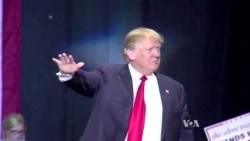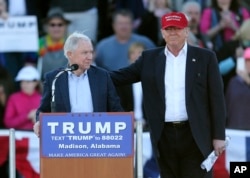Deploring the raw deal he believes the U.S. is getting from the framework of international alliances forged after World War II, Republican presidential candidate Donald Trump is vowing to make major changes if he is elected president in November.
If he were to follow through, analysts say, he would bring about a "revolution" in U.S. foreign policy.
Trump says the United States is a nation with crumbling infrastructure that can no longer afford to be the world’s policeman. On Wednesday, he disparaged the Geneva Conventions, which he says make U.S. troops "afraid" to fight. At a recent CNN town hall meeting, he challenged another bedrock alliance:
"Let me tell you, NATO is obsolete. It was 67 years, or it's over 60 years old. It is — many countries, doesn't cover terrorism, OK? It covers the Soviet Union, which is no longer in existence. And NATO has to either be rejiggered, changed for the better," he said. "I'm not saying — the other thing that's bad about NATO, we're paying too much. We're spending a tremendous — billions and billions of dollars on NATO."
Foreign policy expert Thomas Wright of the Brookings Institution, a Washington public policy research group, said Trump’s comments belittling NATO and others about the U.S. “paying too much” for Japan's and South Korea’s security were not just casual remarks, but reflected passionate views he has held for decades.
“He has a big problem with America’s alliances in Asia and Europe and in the Middle East," Wright said. "He's got a big problem with all of the trade deals and different types of economic engagement the U.S. has engaged with in recent decades. And he’s looking to develop closer ties to authoritarian regimes like [President Vladimir] Putin's Russia. So that would amount to a revolution, really, in U.S. foreign policy.”
Nuclear weapons
Trump also startled many when he refused Wednesday in an MSNBC interview to take the use of nuclear weapons off the table in any situation. He has said he might hit the Islamic State terrorist group with tactical nuclear weapons.
At a time when President Barack Obama is holding a summit with global leaders in Washington to try to prevent the spread of nuclear weapons, Trump said it might be better if countries like Japan, South Korea and Saudi Arabia had their own nuclear weapons so they would not have to rely on the U.S. for protection.
While often expressing resentment of close U.S. allies such as Germany and Japan for not paying for their security, Trump has spoken warmly of Putin: “Putin says very nice things about me. … I think that’s very nice. It has no effect on me, other than I think it’s very nice. If we can get along with Russia, that’s very good.”
Trump said Republican Senator Jeff Sessions of Alabama heads his team of foreign policy advisers, but he has been slow to release names of a full team. Wright said there is one simple reason: ”It’s that the Republican foreign policy establishment does not agree with him. They are shocked and opposed to what he is proposing, and so they don't want to sign on with him. So he's finding it hard to find people, and because of a legitimate disagreement.”
Wright argued that, if elected, Trump’s isolationist views could remove a pillar of world stability: U.S. leadership.
If former Secretary of State Hillary Clinton becomes the Democratic nominee, she will, he said, “find herself in the position in the general election of being the flag-bearer, not just for Democratic Party foreign policy, but for bipartisan American foreign policy since World War II.”







